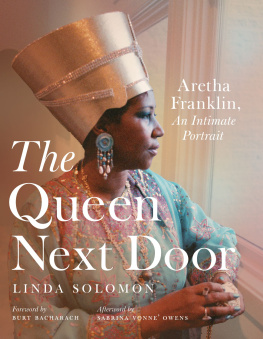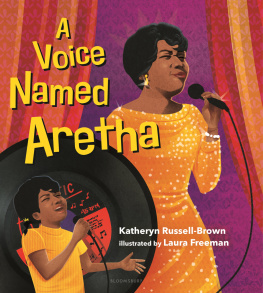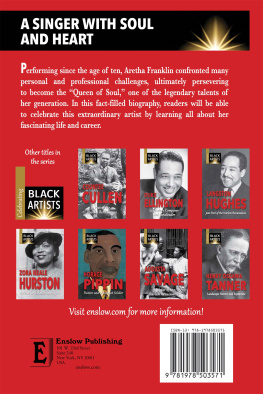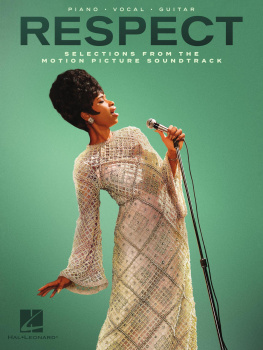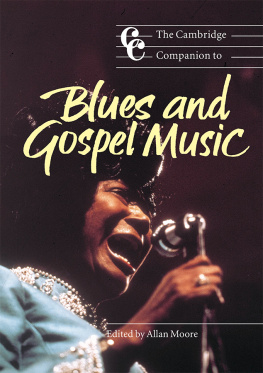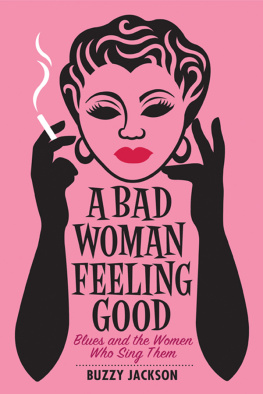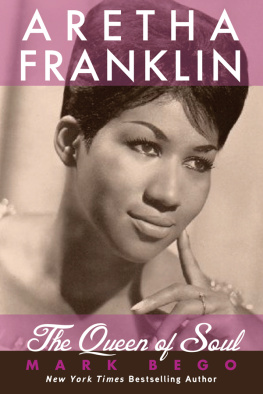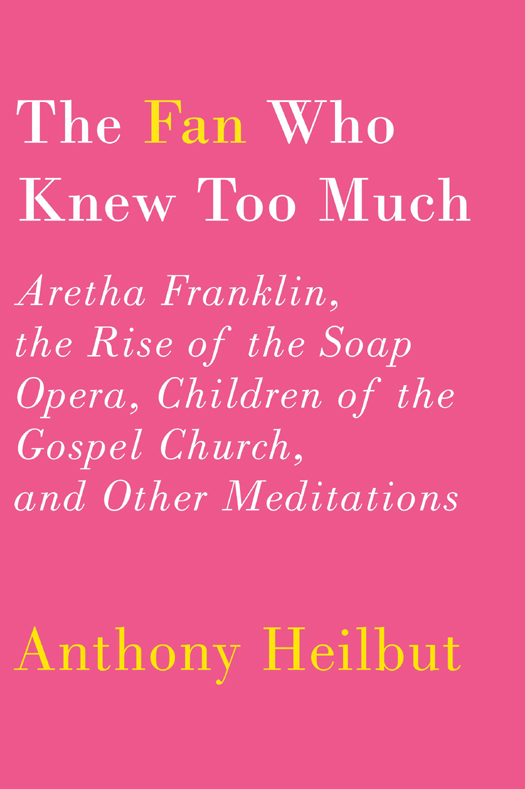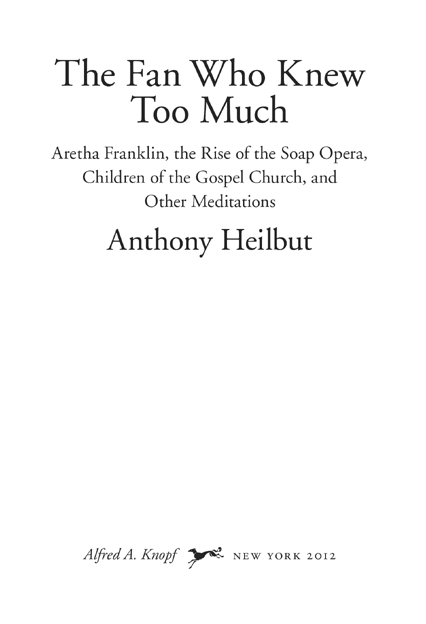Anthony Heilbut - The Fan Who Knew Too Much: Aretha Franklin, the Rise of the Soap Opera, Children of the Gospel Church, and Other Meditations
Here you can read online Anthony Heilbut - The Fan Who Knew Too Much: Aretha Franklin, the Rise of the Soap Opera, Children of the Gospel Church, and Other Meditations full text of the book (entire story) in english for free. Download pdf and epub, get meaning, cover and reviews about this ebook. year: 2012, publisher: Knopf Doubleday Publishing Group, genre: Detective and thriller. Description of the work, (preface) as well as reviews are available. Best literature library LitArk.com created for fans of good reading and offers a wide selection of genres:
Romance novel
Science fiction
Adventure
Detective
Science
History
Home and family
Prose
Art
Politics
Computer
Non-fiction
Religion
Business
Children
Humor
Choose a favorite category and find really read worthwhile books. Enjoy immersion in the world of imagination, feel the emotions of the characters or learn something new for yourself, make an fascinating discovery.

- Book:The Fan Who Knew Too Much: Aretha Franklin, the Rise of the Soap Opera, Children of the Gospel Church, and Other Meditations
- Author:
- Publisher:Knopf Doubleday Publishing Group
- Genre:
- Year:2012
- Rating:5 / 5
- Favourites:Add to favourites
- Your mark:
The Fan Who Knew Too Much: Aretha Franklin, the Rise of the Soap Opera, Children of the Gospel Church, and Other Meditations: summary, description and annotation
We offer to read an annotation, description, summary or preface (depends on what the author of the book "The Fan Who Knew Too Much: Aretha Franklin, the Rise of the Soap Opera, Children of the Gospel Church, and Other Meditations" wrote himself). If you haven't found the necessary information about the book — write in the comments, we will try to find it.
In The Fan Who Knew Too Much, Heilbut writes about art and obsession, from country blues singers and male sopranos to European intellectuals and the originators of radio soap operafigures transfixed and transformed who helped to change the American cultural landscape.
Heilbut writes about Aretha Franklin, the longest-lasting female star of our time, who changed performing for women of all races. He writes about Arethas evolution as a singer and performer (she came out of the tradition of Mahalia Jackson); before Aretha, there were only two blues-singing gospel womenDinah Washington, who told it like it was, and Sister Rosetta Tharpe, who specialized, like Aretha, in ambivalence, erotic gospel, and holy blues.
We see the influence of Arethas father, C. L. Franklin, famous pastor of Detroits New Bethel Baptist Church. Franklins albums preached a theology of liberation and racial pride that sold millions and helped prepare the way for Martin Luther King Jr. Reverend Franklin was considered royalty and, Heilbut writes, it was inevitable that his daughter would become the Queen of Soul.
In The Children and Their Secret Closet, Heilbut writes about gays in the Pentecostal church, the black churchs rock and shield for more than a hundred years, its true heroes, and among its most faithful members and vivid celebrants. And he explores, as well, the influential role of gays in the white Pentecostal church.
In Somebody Elses Paradise, Heilbut writes about the German exiles who fled HitlerEinstein, Hannah Arendt, Marlene Dietrich, and othersand their long reach into the world of American science, art, politics, and literature. He contemplates the continued relevance of the migr Joseph Roth, a Galician Jew, who died an impoverished alcoholic and is now considered the peer of Kafka and Thomas Mann.
And in Brave Tomorrows for Bachelors Children, Heilbut explores the evolution of the soap opera. He writes about the form itself and how it catered to social outcasts and have-nots; the writers insisting its values were traditional, conservative; their critics seeing soap operas as the secret saboteurs of traditional marriagethe women as castrating wives; their husbands as emasculated men. Heilbut writes that soaps went beyond melodrama, deep into the perverse and the surreal, domesticating Freud and making sibling rivalry, transference, and Oedipal and Electra complexes the stuff of daily life.
And he writes of the daytime serials unwed mother, Irna Phillips, a Chicago wannabe actress (a Margaret Hamilton of the shtetl) who created radios most seminal soap operasTodays Children, TheRoad of Life among themand for television, As the World Turns, Guiding Light, etc., and who became known as the queen of the soaps. Hers, Heilbut writes, was the proud perspective of someone who didnt fit anywhere, the stray no one loved.
The Fan Who Knew Too Much is a revelatory look at some of our American icons and iconic institutions, high, low, and exalted.
Anthony Heilbut: author's other books
Who wrote The Fan Who Knew Too Much: Aretha Franklin, the Rise of the Soap Opera, Children of the Gospel Church, and Other Meditations? Find out the surname, the name of the author of the book and a list of all author's works by series.

